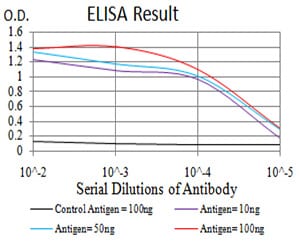
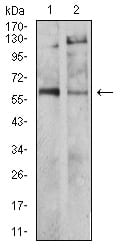
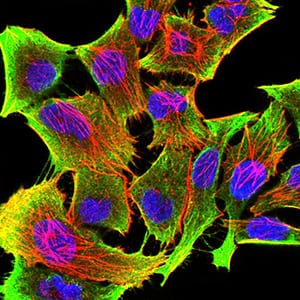
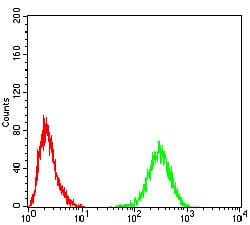
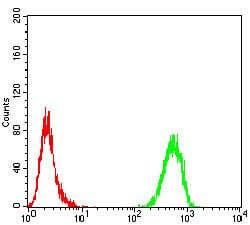
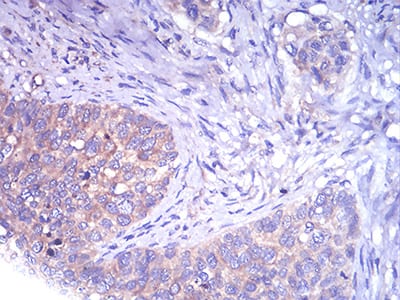
| WB | 1/200-1/1000 | Human,Mouse,Rat |
| IF | 咨询技术 | Human,Mouse,Rat |
| IHC | 咨询技术 | Human,Mouse,Rat |
| ICC | 技术咨询 | Human,Mouse,Rat |
| FCM | 咨询技术 | Human,Mouse,Rat |
| Elisa | 1/1000-1/2000 | Human,Mouse,Rat |
| Aliases | TYH; DYT14; DYT5b |
| Entrez GeneID | 7054 |
| clone | 1B8D2 |
| WB Predicted band size | 58.6kDa |
| Host/Isotype | Mouse IgG1 |
| Antibody Type | Primary antibody |
| Storage | Store at 4°C short term. Aliquot and store at -20°C long term. Avoid freeze/thaw cycles. |
| Species Reactivity | Human,Rat |
| Immunogen | Purified recombinant fragment of human TH (AA: 44-208) expressed in E. Coli. |
| Formulation | Purified antibody in PBS with 0.05% sodium azide |
+ +
以下是关于FSCN1抗体的3篇参考文献及其摘要内容的简要概括:
---
1. **文献名称**: *Fascin1 promotes tumor progression and cell metastasis in esophageal squamous cell carcinoma*
**作者**: Hashimoto Y. et al.
**摘要**: 研究通过免疫组化(IHC)分析FSCN1在食管鳞状细胞癌中的表达,发现其高表达与淋巴结转移和不良预后显著相关,提示FSCN1可能通过增强细胞迁移能力促进肿瘤侵袭。
2. **文献名称**: *Fascin1 regulates breast cancer development and metastasis through Rho/ROCK signaling*
**作者**: Chen L. et al.
**摘要**: 利用FSCN1抗体进行Western blot和免疫荧光(IF)实验,发现FSCN1通过激活Rho/ROCK通路调控乳腺癌细胞的肌动蛋白重塑,促进体内外转移,敲低FSCN1显著抑制肿瘤侵袭性。
3. **文献名称**: *Fascin1 overexpression correlates with epithelial-mesenchymal transition in colorectal cancer*
**作者**: Tan X. et al.
**摘要**: 在结直肠癌组织中,通过FSCN1抗体检测到其过表达与上皮-间质转化(EMT)标志物(如E-cadherin下调)相关,实验表明FSCN1通过调控EMT增强肿瘤细胞的迁移和侵袭能力。
4. **文献名称**: *Fascin1 as a novel biomarker for aggressive ovarian carcinoma*
**作者**: Lin R. et al.
**摘要**: 研究使用FSCN1抗体对卵巢癌组织微阵列进行IHC分析,发现FSCN1高表达与晚期分期、化疗耐药及总生存率下降相关,提示其可作为预后评估的潜在标志物。
---
以上文献展示了FSCN1抗体在癌症研究中的应用,涵盖表达分析、机制探索及临床预后评估,突显FSCN1在肿瘤转移中的关键作用。如需具体论文,建议通过PubMed或Web of Science以标题关键词检索。
Fascin-1 (FSCN1) is an actin-binding protein that plays a critical role in organizing cytoskeletal dynamics by bundling filamentous actin (F-actin) into parallel arrays. Primarily expressed in neuronal, endothelial, and epithelial cells under normal conditions, FSCN1 is crucial for cell motility, adhesion, and structural stability. Its overexpression is strongly linked to aggressive cancer phenotypes, including metastasis and poor prognosis, making it a biomarker of interest in malignancies such as breast, colorectal, lung, and pancreatic cancers.
FSCN1 antibodies are immunological tools designed to detect and quantify Fascin-1 expression in research and diagnostic settings. These antibodies enable the study of FSCN1's role in cancer progression, particularly its involvement in invadopodia formation, which facilitates extracellular matrix degradation and tumor invasion. Commercially available FSCN1 antibodies are widely used in techniques like immunohistochemistry (IHC), Western blotting, and immunofluorescence to assess protein localization and expression levels in tissue samples or cell lines.
Clinically, FSCN1 antibodies aid in stratifying patients based on tumor aggressiveness, as elevated Fascin-1 levels correlate with resistance to therapy and reduced survival. Additionally, they support drug development efforts targeting FSCN1 to inhibit metastatic pathways. Despite their utility, cross-reactivity with homologous proteins (e.g., Fascin-2/3) requires careful validation to ensure specificity. Overall, FSCN1 antibodies are pivotal in unraveling the molecular mechanisms of cancer and exploring therapeutic strategies against metastasis.
×